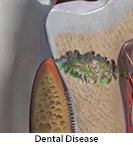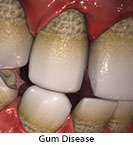
Gingivitis (Gum Disease)
________________________________________________________________________
KEY POINTS
- Gingivitis is the first stage of gum disease. It often causes tender, swollen, bleeding gums.
- Treatment starts with professional cleaning of your child's teeth. Other treatments may include brushing and flossing, antibacterial mouthwash, vitamins, changes in the medicines your child takes, or gum surgery.
- It is important for your child to brush and floss regularly, and to have regular dental exams and professional cleanings.
________________________________________________________________________
What is gingivitis?
Gingivitis is tender, swollen, bleeding gums. It’s the first stage of gum disease. If gingivitis is not treated, the bacteria causing the problem may attack the bones and other tissues that support your child’s teeth. The bacteria can destroy the bone. Your child’s teeth may get loose and need to be pulled.
Gingivitis is most common in children 6 to 7 years of age when the permanent teeth start coming in.
What is the cause?
Gingivitis is most often caused by bacteria in plaque. Plaque is a sticky material that builds up on your child’s teeth. It is made of mucus, saliva, food particles, acids, and bacteria. If it’s not removed with daily brushing and flossing, plaque can lead to cavities, a hard buildup called tartar, and gum disease.
Other things that can lead to gingivitis are:
- Injury to the gums from not brushing and flossing teeth correctly
- Untreated decay along the gum line
- Loose fillings or crowns
- Vitamin deficiency, especially a lack of vitamin C
- Diseases such as diabetes and problems with the immune system that make it harder for your child’s body to fight infection or cause the body to attack its own tissue
- Infection of the mouth and gums
- Medicines that make your child’s mouth dry or that may cause the gums to get easily inflamed and swollen
Mental or physical stress can make gum disease worse.
What are the symptoms?
Symptoms may include:
- Tender, swollen gums that bleed easily
- Spongy, shiny gum tissue that looks red or purple
- Bad breath
- Sensitivity to cold, air, and acidic food, like orange juice or tomatoes
- Teeth that are loose or moving apart from one another
- A bad taste in your child’s mouth
- Gums that have pulled away from your child’s teeth
- A change in the way your child’s teeth fit together when your child bites
How is it diagnosed?
Your child’s dentist will examine the teeth, gums, and jaw. The dentist will check to see if your child has any tooth decay or bone or gum loss.
How is it treated?
Treatment starts with professional cleaning of your child’s teeth. The dentist or dental hygienist will remove tartar and plaque from the surfaces of your child’s teeth. After the tartar and plaque are removed and the tooth and root surfaces are clean, the tissue can heal.
Other treatments may include:
- Brushing for 2 minutes, 2 times a day, with proper flossing
- Antibacterial, alcohol-free mouth rinse
- Changes in the medicines your child takes if the problem has been caused or worsened by medicines
- Vitamin supplements
- Gum surgery
How can I take care of my child?
- The dentist or hygienist will teach your child the best ways to brush and floss teeth.
- It helps if your child rinses the mouth with warm salt water (1 cup warm water mixed with 1/2 teaspoon of salt) to soothe the gums and lessen swelling.
- Give your child nonprescription pain medicine, such as acetaminophen, ibuprofen, or naproxen to treat pain. Read the label carefully and give your child the correct dose as directed.
- Nonsteroidal anti-inflammatory medicines (NSAIDs), such as ibuprofen, naproxen, and aspirin, may cause stomach bleeding and other problems.
- Check with your healthcare provider before you give any medicine that contains aspirin or salicylates to a child or teen. This includes medicines like baby aspirin, some cold medicines, and Pepto-Bismol. Children and teens who take aspirin are at risk for a serious illness called Reye’s syndrome.
- Acetaminophen may cause liver damage or other problems. Do not give more doses than directed. To make sure you don’t give your child too much, check other medicines your child takes to see if they also contain acetaminophen. Unless recommended by your healthcare provider, your child should not take this medicine for more than 5 days.
- Make sure that your child eats a healthy diet.
If your child has diabetes, the health of your child’s gums needs to be checked regularly. Diabetes makes it harder for your child’s body, including gum tissue, to heal. It may also cause your child to have less saliva. Saliva helps reduce acid and washes away debris.
How can I help prevent gum disease?
The best way to prevent gum disease is good dental hygiene.
- Follow your dentist’s instructions for cleaning and flossing your child’s teeth. Make sure that your child:
- Brushes the tongue to help remove bacteria and food.
- Gently massages gums with a soft toothbrush.
- Replaces the toothbrush every 3 months and after your child has a cold, flu, or sore throat.
- Never shares a toothbrush. It holds bacteria that can be passed from one person to another no matter how well you clean the brush.
- Gets regular dental exams and professional cleanings.
You can get more information from:
- American Dental Association
800-621-8099
http://www.mouthhealthy.org/en/
Last modified: 2017-01-03
Last reviewed: 2017-01-03


